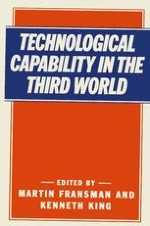1984 | OriginalPaper | Chapter
Insular and Open Strategies for Enhancing Scientific and Technological Capacities: Indian Educational Expansion and its Implications for African Countries
Author : Thomas Owen Eisemon
Published in: Technological Capability in the Third World
Publisher: Palgrave Macmillan UK
Included in: Professional Book Archive
Activate our intelligent search to find suitable subject content or patents.
Select sections of text to find matching patents with Artificial Intelligence. powered by
Select sections of text to find additional relevant content using AI-assisted search. powered by
The newly industrialised countries of East and Southeast Asia, first Japan and then in succession Taiwan, Singapore, and Hong Kong, have provided demonstrations of ‘development’ in what was once regarded as the capitalist periphery. Whether these countries are still considered to be appendages of international capitalism or examples of autonomous development is not an issue here. Irrespective of the interpretations given their economic performance, lessons are being drawn for the less developed countries of Africa and Asia. Typically and with much oversimplication the growth rates of the newly industrialised countries are attributed to a mix of economic policies favouring openness to foreign investment, to imported technology and to a collaborative relationship between government and the private sector especially in export industries. Predictably the economic strategies of these countries are favourably compared with countries that espouse scientific and industrial self-reliance. The insularity of the rhetoric of self-reliance is contrasted with the ‘learning and copying’ approach to scientific and technological development practised in Meiji and modern Japan and in other newly industrialised countries. (See, for instance, Ronald Dore’s provocative essay in this volume.)
